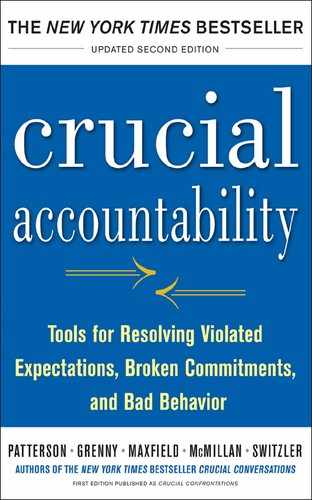Appendix D
Discussion Questions for Reading Groups
Move from “thinking about it” to “got it” with a regular discussion of Crucial Accountability. Organize a small group of family members, friends, coworkers, or colleagues and hold a weekly discussion. Here’s a short list of questions sure to kick-start any group discussion.
For a downloadable version of the discussion questions found in this book, visit http://www.vitalsmarts.com/bookresources.
1. Behind the serious and long-lasting problems that families, teams, or organizations typically face are accountability conversations that people either aren’t holding or aren’t holding well. Explain.
2. What are the accountability conversations you typically avoid? What performance gaps have you had the courage to step up to but have handled poorly?
3. When deciding if they should hold an accountability conversation, what tricks do people typically employ in order to talk themselves out of speaking up? What tricks do you use most often? What will it take for you to break the silence-to-violence habit?
4. When deciding what to confront, what mistakes do people typically make? How does the term “Groundhog Day” apply to accountability conversations?
5. Someone has let you down. You figure he or she did it on purpose, and so you’re about to give the person a piece of your mind. Why is it that you are now you at risk of making the situation worse?
6. Why are the first few seconds of an accountability conversation so important? What mistakes do people typically make when first describing a performance gap?
7. What motivates people and why? When it comes to motivating others, what mistakes are people in positions of power likely to make?
8. When people aren’t able to deliver on a promise, what mistakes might a new leader or parent make? When others are blocked from performing, why ask them for their ideas on how to solve the problem? Why should you “make it easy” for others?
9. You’re talking about a problem, and a new one comes up—what should you do? If you decide to deal with the new problem, when are you merely being distracted? When are you being sensible and flexible?
10. What principle from this book did you find most important? Which one was the most surprising?
11. What skill did you find to be the most difficult to put into practice? Why was that? What will it take to get better at that skill?
12. How can your discussion group help each member become better at holding accountability conversations?
13. How can you help one another prepare or practice for a particularly difficult conversation?
14. What methods can you use to remind yourselves to be on your best behavior—particularly when you’re becoming upset and are about to move into “lecture mode”?
